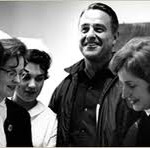Shriver Stories: Sarge in Turkey after the death of JFK
An orange hard cover book with Sarge’s picture sits on my mother’s coffee table. It’s been there since 1965. Sargent Shriver: A Candid Portrait by Robert Liston has a bookmark on page 120. That’s the black and white photo section which features Sarge on a raft in North Borneo, Sarge sharing bread in an Iranian bakery, Sarge visiting with the Shah of Iran, and Sarge at my Peace Corps site in a hospital in eastern Turkey.

Sarge with PCV nurses in Sivas, Turkey
I am dressed in white, with starched cap, pale hose and polished nurse’s shoes. Sarge is tall and athletic looking, with cropped hair and a ruddy face. He wears slacks and a bulky ribbed cardigan frayed around a small hole on the left shoulder. Scuffed boots warm his feet. In the background, temperature charts hang over white metal cribs in a Turkish pediatric ward. Veiled mothers wearing hospital-issued gowns sit at bedsides. They are on hand around the clock to comfort and feed their sick little ones. Like mannequins these village women sit and stare at us. I make a plea for Sarge’s help.
In my right hand I hold a glass thermometer. My left hand extends to explain that our school of nursing is in urgent need of teaching supplies. He listens earnestly and promises a modest budget.
And then Sarge is off to the orphanage and high school, the other sites where PC volunteers work in this central Anatolian railroad town of 50,000.
His departure reminds me to get on to the afternoon shopping. My roommates and I must prepare to serve tomorrow’s breakfast to Sarge, his entourage and eight Peace Corps volunteers. Bundled in winter wear and snow boots and carrying several string bags, I head for the open market, wondering how to explain to the poultry vendor my need for fifty eggs. But he asks no questions and gleefully wraps up the thirty in his inventory, takes my money and sends me in the direction of his brother’s stall.
The breakfast is hearty, a full platter of scrambled eggs layered with herbed cheese garnished with home fried potatoes. We hug our steamy mugs filled with spiced Turkish tea. When dishes are cleared away, Sarge calls the eight Volunteers together. We pull up chairs in a circle. Only two months have passed since our early November 1963 arrival in Turkey, and so much has changed. When we ask Sarge to describe how the Kennedy family, the Peace Corps staff and Americans in general responded to the assassination he takes a deep breath as if to steady himself. Tales of November 22 and its aftermath pour out. We hang onto his every word.
We feel compelled to tell him where we were when we heard the news. Two
Turkish nurses had run into our dormitory holding a portable radio. They
were sobbing and screaming, “Baskinin Kennedy Olmis!” We didn’t understand,
our Turkish language was so new and our vocabulary so limited. Their sobs
and screams continued until finally we knew the truth. Grief and loss
flooded Ankara. Flags flew at half mast as sober and silent people walked
the streets. The American Embassy opened its doors for ceremony and
reflection.
Suddenly his time had run out. Sarge’s plane was scheduled to leave
within the hour. We said our goodbyes. His departing words gave comfort,
inspiration and a sense of mission. “You are the ones who must carry the
torch.”
No comments yet.
Add your comment